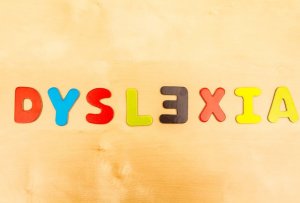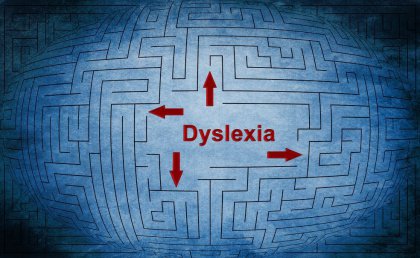If Your Child Has Dyslexia

When any parent is told that their child has a disease, disorder etc., their first reaction is to be in total shock. Often the love we feel for our child causes us to sometimes over exaggerate the problem that the specialist is explaining to us. But the truth is that sometimes these obstacles are great opportunities for ourselves and for our children.
If your child has dyslexia do not despair; your child can still achieve anything he or she wants.
What is dyslexia?
The first documented cases of dyslexia appeared over 100 years ago. Since then, debate on how to hit the exact definition, diagnosis and treatment have not ceased.
Currently, the most accepted definition is offered by the 2002 International Dyslexia Association:
“Specific Learning Disability (SLD), of neurobiological origin, is characterized by difficulties with accurate and fluent word recognition and poor spelling and decoding. These difficulties result from a deficit in the phonological component. ” It is not a disease and therefore has no cure.
The brain of a dyslexic person is different in certain areas such as the superior temporal area of the left hemisphere, which is responsible for phonological processing, and in the occipitotemporal area that forms the visual representations of words. It is thought that this is caused by a malfunction of some genes during embryonic development.
Help for those with dyslexia
Luz Rello suffers from dyslexia and is an expert in this field. Thanks to her, we have a new application called “Piruletas” that consists of a series of exercises and games to help people with this problem and has been shown to significantly improve spelling.
We also have DysWebxia, an application to adapt texts for those with dyslexia in order to help get children to read faster.
Many parents of children with dyslexia have taken to the web to share their experiences. These blogs can be helpful support forums for other parents. One mother, Maria, began blogging with the help of her dyslexic daughter. As she says, “I was desperate, stressed and looking for a way to vent, convinced that only my mother and a few others would read it.” But to her surprise, her blog began to receive many visits from other mothers whose children suffer from dyslexia. Her eldest son, who is also dyslexic, is studying Telecommunications Engineering: an example that you can be whatever you want despite being dyslexic.

Recommendations for people with dyslexia
- The best way to help a dyslexic child is to provide tools to compensate for the difficulties they have to face when confronted with words; tools that will give them the confidence and encouragement to skip that small hurdle and move on.
- The earlier you detect that your child that has this difficulty, the better you will be able to deal with it and put into action the aforementioned tools.
- Parents should stay calm and not exaggerate the problem, but also not let it go either. Keep in mind that action is needed because if there really is a problem, it won’t disappear by itself.
- Work together with those people who are part of the child’s education. Whether it’s their teachers or other family members, everyone can and should come together. In the future, the child will greatly appreciate any push in the right direction given at an early age.
The singer Pau Donés, the handsome Grey’s Anatomy actor Patrick Dempsey, and the founder of IKEA are all dyslexic. Dempsey acknowledges “For me it is very difficult to read the scripts … But I’ve never given up.”
We’ll end with a quote from Luz Rello which we hope will serve you all well: “School is the worst drink for a dyslexic. But one day it ends. Good Luck! After school you can study what you want, be what you want, use all the tools that you want. “
When any parent is told that their child has a disease, disorder etc., their first reaction is to be in total shock. Often the love we feel for our child causes us to sometimes over exaggerate the problem that the specialist is explaining to us. But the truth is that sometimes these obstacles are great opportunities for ourselves and for our children.
If your child has dyslexia do not despair; your child can still achieve anything he or she wants.
What is dyslexia?
The first documented cases of dyslexia appeared over 100 years ago. Since then, debate on how to hit the exact definition, diagnosis and treatment have not ceased.
Currently, the most accepted definition is offered by the 2002 International Dyslexia Association:
“Specific Learning Disability (SLD), of neurobiological origin, is characterized by difficulties with accurate and fluent word recognition and poor spelling and decoding. These difficulties result from a deficit in the phonological component. ” It is not a disease and therefore has no cure.
The brain of a dyslexic person is different in certain areas such as the superior temporal area of the left hemisphere, which is responsible for phonological processing, and in the occipitotemporal area that forms the visual representations of words. It is thought that this is caused by a malfunction of some genes during embryonic development.
Help for those with dyslexia
Luz Rello suffers from dyslexia and is an expert in this field. Thanks to her, we have a new application called “Piruletas” that consists of a series of exercises and games to help people with this problem and has been shown to significantly improve spelling.
We also have DysWebxia, an application to adapt texts for those with dyslexia in order to help get children to read faster.
Many parents of children with dyslexia have taken to the web to share their experiences. These blogs can be helpful support forums for other parents. One mother, Maria, began blogging with the help of her dyslexic daughter. As she says, “I was desperate, stressed and looking for a way to vent, convinced that only my mother and a few others would read it.” But to her surprise, her blog began to receive many visits from other mothers whose children suffer from dyslexia. Her eldest son, who is also dyslexic, is studying Telecommunications Engineering: an example that you can be whatever you want despite being dyslexic.

Recommendations for people with dyslexia
- The best way to help a dyslexic child is to provide tools to compensate for the difficulties they have to face when confronted with words; tools that will give them the confidence and encouragement to skip that small hurdle and move on.
- The earlier you detect that your child that has this difficulty, the better you will be able to deal with it and put into action the aforementioned tools.
- Parents should stay calm and not exaggerate the problem, but also not let it go either. Keep in mind that action is needed because if there really is a problem, it won’t disappear by itself.
- Work together with those people who are part of the child’s education. Whether it’s their teachers or other family members, everyone can and should come together. In the future, the child will greatly appreciate any push in the right direction given at an early age.
The singer Pau Donés, the handsome Grey’s Anatomy actor Patrick Dempsey, and the founder of IKEA are all dyslexic. Dempsey acknowledges “For me it is very difficult to read the scripts … But I’ve never given up.”
We’ll end with a quote from Luz Rello which we hope will serve you all well: “School is the worst drink for a dyslexic. But one day it ends. Good Luck! After school you can study what you want, be what you want, use all the tools that you want. “
This text is provided for informational purposes only and does not replace consultation with a professional. If in doubt, consult your specialist.







